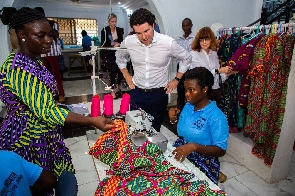The Ghanaian economy has on average performed well in the last two decades, with a slowdown in growth in recent times; this growth is, however, yet to be reflected in employment creation and improvements in employment conditions for many, especially youth and women.
The negative effects of gender barriers add up over their life cycle and are transmitted to future generations resulting in intergenerational transfers of constraints and barriers that limit young women’s opportunities in the world of work.
The birth of YEVU Clothing; an Australian-owned socially responsible clothing label is providing women in Ghana’s informal sector with a better and more sustainable income, as well as access to improved livelihoods for their families and immediate communities.
Borne out of a meeting between Australian
Anna Robertson and Ghanaian, Felicia Adwubi in 2012, Yevu now produces more than 10,000 clothing units per year in their Accra factory, the majority of which is exported predominantly to Australia.
The project provides full-time employment for 30 staff, with 80 percent of YEVU’s workforce women.
YEVU
staff earn two to three times what they were making before joining YEVU, and all workers earn above
the living wage.
The move has resulted in 170 family and community members benefitting from
income generated through YEVU.
In addition, every child of a YEVU team member attends school.
The project, in the spirit of SDG 5, could be described as a reform giving women equal rights to economic resources, financial services, inheritance, and natural resources, in accordance with national laws as well as providing educational opportunities for their children.

General News of Friday, 9 December 2022
Source: footballghana.com

















